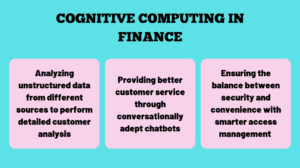Cognitive computing is set to transform the financial services industry by improving business processes.
The numerous applications of artificial intelligence in the finance industry are already providing organizations — both banking and non-banking ones — with unprecedented levels of automation and efficiency. And the results are already inspiring many a finance CIO to adopt more applications of the technology for further enhancing their operations. However, despite the value added by the different AI applications in finance, the existing applications only scrape the surface of the huge potential held by AI technology. However, that does mean that businesses are not using enough intelligent technologies; it’s just that the technologies used by them are not intelligent enough. The thing about artificial intelligence is that it is constantly evolving, and as newer and more amazing applications emerge, the primordial applications of the technology — such as the text prediction on your smartphone keypad — stop being considered as actual artificial “intelligence”. Thus, the demographic-based marketing emails, the system-generated transaction details that are automatically texted and emailed to customers, the SMS-based security verification for online shopping, and the automated procedure of issuing a new credit/debit card as soon as an old one expires that is used in banking and finance, although impressive when they first came into practice, are now just a standard part of the operations of banks all over the world. They contain some rudimentary elements of AI that minimize or eliminate the need for human intervention from routine, repetitive, and voluminous tasks. But AI is evolving through its different branches like deep learning and its applications are becoming even more intelligent by picking up the thought and problem-solving patterns of humans. One such branch of AI is cognitive intelligence or cognitive technology. Read on to know what cognitive intelligence actually is and learn the potential impact of cognitive technology in finance.
.
Cognitive Computing: Making AI More ‘Intelligent’
So what is cognitive computing? Cognitive computing, put simply, is the branch of computer science that attempts to give machines the ability to think and behave like humans. Now you may think, “Isn’t that what all AI systems do?” While it is true that both AI and cognitive computing purport to emulate human intelligence, there is a difference between AI and cognitive computing. Artificial intelligence, in general, deals with making machines capable of analyzing data and independently making decisions based on the data provided, like humans. Cognitive computing also analyzes data and makes decisions autonomously, but acts in close accordance with human behavior. Cognitive computing systems interact naturally with humans to identify and solve their problems. They are built on AI systems with the added ability to interact with humans and understand the situational context. A simplified way to differentiate AI and cognitive computing is understanding the capabilities of chatbots or your personal mobile assistants. While these AI-based systems are getting increasingly adept at answering your questions, they are nowhere near as effective (yet) as having a human assistant. For instance, if you ask these systems a general question, they may simply respond by displaying the online search results for the phrase you used. They cannot search for the specific information and give you a definite answer (unless the questions happen to be something simple, such as those pertaining to the weather or traffic.) These applications are capable of answering only a limited range of queries from the user. And these questions must be phrased almost to perfection for you to receive relevant responses. On the other hand, cognitive computing systems use more advanced algorithms to enable them to understand naturally spoken or written human communications. They can also present information in an easily understandable manner. Thus, cognitive computing is just AI having significantly high levels of analysis and complex problem-solving ability.
.
Humanized Fintech: Cognitive Technology in Finance
Banking and financial institutions, in their effort to efficiently serve an increasing number of customers, have been quick to adopt technologies that automate their processes. In addition to automating the back-end and administrative tasks, these technologies have now begun to dominate their customer-facing activities.
.

.
These activities include basic banking services like money withdrawals, payments and transfer of funds, bank statement printing, resolving transaction-related issues, and solving account-related queries. People are increasingly becoming aware that they are more likely to deal with machines than with humans when interacting with banks. While they are not averse to this “robotization” of banking, they expect these systems to be as effective, if not more, than the human-driven version. And it is in the banks’ best interests to make these machines more “human” in terms of their ability to interact with customers as well as understand and solve individual customer issues.
Thus, banks are constantly investing in technologies and initiatives to make their interactions with their customers’ more human and convenient. To that end, they are leveraging big data analytics to personalize customer interactions and using AI-powered chatbots to solve customer queries in a friendly, convenient, and efficient manner. The use of cognitive technology in finance will build on these technologies and make banking and finance more efficient while also ensuring a great customer experience by helping in the following ways:
.
1. Detailed Customer Analysis
Businesses, including those in the finance sector, are already using tools such as big data analytics and machine learning to perform broad market analysis and individual customer analysis to identify their pain-points and expectations. However, most of the existing tools are unable to capture all the information that is available both on the internet and within the organization’s internal data warehouses. That’s because most analytics tools cannot make sense of unstructured data, which makes up a majority of all the data that is generated through sources like social media content and customer care communications, which are in natural language. Using cognitive computing with advanced natural language processing capabilities can enable businesses to gather insights from such sources and make decisions based on highly detailed information. Such decisions will have very low risk associated with them, leading to more effective actions, and, consequently, better results.
.
2. Contextualized Customer Service
Customer care chatbots are becoming an increasingly ubiquitous feature of business websites. These chatbot applications minimize the need for human executives to be involved in minor cases. Only cases involving a certain degree of complexity are escalated to the human customer care executives. The use of cognitive computing in finance organizations’ websites and mobile applications will improve their functionality and enable them to solve even complex queries with accurate information. These chatbots can understand any query typed in natural language and can convert the necessary information from the organization’s database into natural language for the customer to understand. For example, a chatbot powered by cognitive computing can explain to a customer why a transaction is taking longer than usual in simple terms and also answer follow up questions by drawing on the requisite information quickly from the right sources.
.
3. Improved Security and Identity Management
Cognitive computing can enable the security systems used by banks and other financial institutions to be more robust yet flexible. This will minimize the risk of illicit transactions, identity theft, and information leakage while simultaneously maximizing the ease of performing transactions that are legitimate. Banks often use strict multi-step security procedures to verify the identity of customers while offering them services, which is desirable. But this may often make the process inconvenient for customers. Using security systems powered by cognitive computing, banks and financial institutions can balance the strength of security against illicit entities with the convenience of access for legitimate customers. Cognitive computing can analyze factors pertaining to customer behavior such as their usual modes of transaction, the usual beneficiaries, the average transactions with different beneficiaries, average monthly spending, and other relevant details. With this information as a reference, the security systems can determine the likelihood of a transaction being legitimate. And depending on the probability, it can either tighten the security by introducing additional verification steps or keep them to a minimum.
Thus, cognitive computing can not only improve the convenience for customers but also increase the operational efficiency through automation. Additionally, the use of cognitive technology in finance can help in improving the security of money and assets. Banking players can even build innovative use cases for cognitive computing to create new revenue streams. To do so, these businesses must first get acquainted with the technology and its capabilities by monitoring its implementation in established use cases. This will enable the technology leaders to first capitalize on the low hanging fruit, which will help in building momentum as well as investor confidence for more experimental applications.
.
By Naveen Joshi, December 2020, Published on BBN Times






